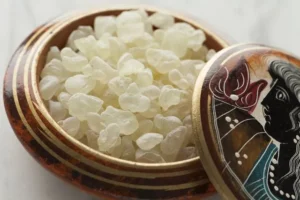
Mastic gum is a licorice-flavored resin extracted from the bark of the Pistacia lentiscus tree native to the Mediterranean region. Traditionally chewed as a breath freshener and digestive aid, mastic gum has gained recent attention for its potential benefits in promoting gut health.
This article explores the emerging evidence on how mastic gum may support digestive health and discusses important considerations before incorporating it into your wellness routine.
Mastic Gum Production Process
Mastic gum is harvested by making small cuts in the bark of the Pistacia lentiscus tree, allowing the resin to ooze from the tree. Within 15 days, the tear-shaped resin droplets harden and solidify, at which point growers collect and store them for drying. After a year, the resin is cleaned, sorted, and graded before it is sold for various uses.
Compounds in Mastic Chewing Gum: Understanding Benefits
Mastic chewing gum’s health benefits stem from its rich composition of antioxidant, antibacterial, and anti-inflammatory compounds. Here’s a breakdown of how these compounds may promote gut health.
Protect Against Bacterial Infection
The most abundant compounds in mastic gum, triterpenes, make up 65% to 70% of the total weight of mastic gum. Triterpenes are chemical compounds with anti-inflammatory, antimicrobial, and antioxidant properties that may benefit gut health.
Research shows triterpenes have antibacterial properties that may help combat Helicobacter pylori (H. pylori)—a bacterium associated with the development of peptic ulcers (open sores that develop on the inside lining of the stomach and the upper part of the small intestine), gastritis (inflammation of the stomach lining) and stomach cancer.
Triterpene acids in mastic gum inhibit the growth of H. pylori and disrupt the ability of the bacterium to invade cells on the stomach lining, which may protect against infection and lower the risk of gastrointestinal disorders.
Monoterpenes, specific chemical compounds in mastic gum, exhibit broad-spectrum antibacterial activity against gut bacteria associated with food-borne illnesses, including Escherichia coli (E. coli ) and Bacillus subtilis (B. subtilis). By inhibiting the growth of these bacteria, mastic gum may reduce the risk of food poisoning.
Relieve Digestive Discomfort
Mastic gum’s anti-inflammatory and antioxidant compounds may alleviate the digestive discomfort associated with gut inflammation and irritation. An older study found that daily administration of 1 gram (g) of mastic gum provided symptom relief in people with duodenal ulcers (sores in the first part of the small intestine).
Subsequent endoscopic procedures showed ulcer healing occurred in 70% of study participants treated with mastic gum.
Some research suggests mastic gum may have mild antacid properties, which may soothe heartburn (acid reflux) and indigestion. One study found that daily administration of 350 milligrams (mg) of mastic gum three times daily for three weeks significantly improved symptoms of dyspepsia (indigestion) in study participants.
Support a Healthy Gut Microbiome
A healthy gut microbiome is important for nutrient absorption, digestive health, immune function, and overall health. Mastic gum’s antimicrobial actions may promote a healthy gut microbiome by preventing the overgrowth of harmful bacteria while supporting the growth of beneficial microbes.
Antioxidant and anti-inflammatory compounds in mastic gum also help soothe gut inflammation and create a more hospitable environment for beneficial bacteria to flourish.
Protects Against Oxidative Stress and Damage
Mastic gum is rich in polyphenols—potent antioxidants that neutralize harmful free radicals and protect the body from oxidative stress. Oxidative stress causes inflammation, which can damage gut cells and contribute to the development of chronic gastrointestinal (GI) disorders.
Polyphenols in mastic gum also help maintain the strength and integrity of the intestinal barrier. This may help lower the risk of infection and chronic gut diseases and promote overall gut health.
Reduce Inflammation
Chronic inflammation in the GI tract contributes to the development and progression of gastrointestinal disorders, including the inflammatory bowel diseases (IBDs) Crohn’s disease and ulcerative colitis. Research shows that mastic gum contains anti-inflammatory compounds that may control gut inflammation.
Triterpene acids and polyphenic compounds in mastic gum exhibit powerful anti-inflammatory properties that regulate inflammatory pathways and reduce the amount of inflammatory substances in the gut. By regulating immune activity and reducing inflammation, mastic gum may help prevent the development of IBDs or their symptoms like abdominal pain, diarrhea, and bloating.
Mastic Gum: Traditional Uses
Mastic gum boasts a rich history of use as a traditional medicine. For over 2,500 years, humans have chewed mastic gum as a natural remedy to support:
- Healthy digestion
- Infection control
- Oral hygiene
- Wound healing
How Often to Chew Mastic Gum
While the potential benefits of mastic gum for gut health are promising, research on its optimal use for gut health is ongoing. There are no recommendations on optimal amounts for how often and long to chew mastic gum.
Studies exploring mastic gum’s effects on gut conditions have involved varying amounts, ranging from 350 mg three times a day to 2.8 g daily.
Here are some general tips for safely incorporating mastic gum into your routine:
- Start slow: Begin with a small amount, chewing one or two pieces of gum for 15 to 20 minutes before meals.
- Listen to your body: Pay close attention to how you feel after chewing. If you experience any discomfort like jaw fatigue, discontinue use or reduce the amount or how long you chew it.
- Choose high-quality mastic gum: Opt for high-quality mastic gum from reputable sources to ensure purity and optimal benefits.
Should Anyone Not Chew Mastic Gum?
Mastic gum is generally safe and well-tolerated, with no reported adverse effects or drug interactions. However, research on the effects of mastic gum on human health is limited, and people with certain conditions should exercise caution before chewing mastic gum:
- Pregnancy and breastfeeding: Research on the use of mastic gum during pregnancy and breastfeeding is limited, and pregnant and breastfeeding people should avoid it.
- Allergies to Pistacia tree species: People with allergies to trees in the Pistacia family should avoid mastic gum, as it may trigger allergic reactions.
As with any supplement, it is important to consult a healthcare provider before incorporating mastic gum into your routine, especially if you have underlying conditions or are taking medications. Your provider can help you determine the appropriate amount and how often to chew mastic gum.
Mastic Gum With Added Ingredients
There are different ways to enjoy mastic gum: pure teardrops containing 100% mastic gum and commercially prepared chewing gum with added ingredients.
Prepackaged mastic chewing gums include additional ingredients such as:
- Sweeteners: Sugar or sugar alcohols, such as xylitol, sorbitol, or maltitol
- Flavorings: Mint, fruit, ginger, or cinnamon flavoring, which are combined with the natural, licorice-like flavor of mastic gum to create a unique flavor profile
- Thickeners: Gums like guar gum or xanthan gum to help maintain the gum’s texture
- Probiotics: Live bacterial cultures aimed at promoting gut health
Ingredients vary widely among brands and products. Always check the label and choose options that align with your dietary needs.
Summary
Mastic gum, a resin extracted from the Pistacia lentiscus tree, has a rich history of use in traditional medicine as a natural remedy for supporting oral and digestive health. Research shows mastic gum may be especially beneficial for gut health, helping to promote a healthy gut microbiome, protect the intestinal barrier, and fight bacterial infections associated with an increased risk of gastrointestinal diseases.
While mastic gum is generally well-tolerated, talk to a healthcare provider before trying mastic gum to ensure you experience its benefits safely and effectively.















































